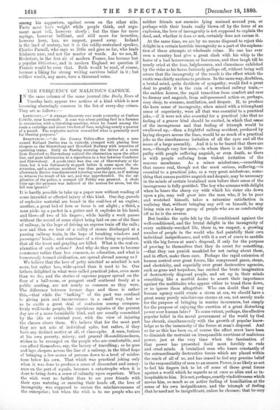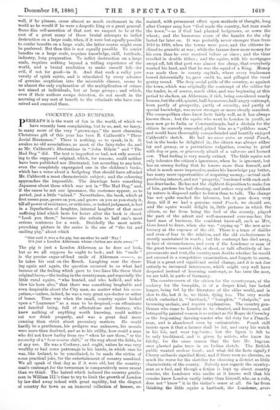THE FREQUENCY OF MALICIOUS CAPRICE.
IN the same column of the same journal (the Daily News of Tuesday last), appear two notices of a kind which is now becoming alarmingly common in the list of every-day crimes. They are as follows :— LOWESTOFT.—" A strange discovery was made yesterday at Carlton Colville, near Lowestoft. A man was about putting fuel in a furnace in connection with a threshing-machine, when he found among the coals a cartridge and about two feet of fuse, weighing nearly a quarter of a pound. The explosive matter resembled what is generally used for blasting purposes."
SithEivsatrsic.—" At the County Police-office yesterday, a man named Richard Davies was in custody, charged with placing four sleepers on the Shrewsbury and Hereford Railway with intention of upsetting trains. Early on Sunday morning the driver of a train from Hereford to Shrewsbury noticed the obstruction upon the other line, and gave information to a signalman in a box between Condover and Shrewsbury. A goods train was due out of Shrewsbury at the time, but it was fortunately stopped before it came upon the ob- struction, and a serious accident was thus probably averted. Soon afterwards Davies was discovered loitering near the spot, as if waiting to witness the result of his act, and was apprehended. On the ap- plication of the police, a remand till Friday was granted. A short time ago the prisoner was indicted at the assizes for arson, but the bill was ignored."
It is hardly possible to take up a paper now without reading of
some intended or effected injury of this kind. One day, parcels of explosive material are found in the coal-box of an engine ; another, a great bed of fern or furze is set alight ; a third, a man picks up a packet in a gutter and it explodes in his hand, and blows off two of his fingers ; while hardly a week passes without the record of some object being laid on one of the lines of railway, in the hope of driving an express train off the rails; now and then we hear of a volley of stones discharged at a passing railway train, in the hope of breaking windows and passengers' heads ; and sometimes of a river being so poisoned, that all the trout and grayling are killed. What is the real ex- planation of such actions ? And why do they seem to become commoner rather than less common, as education, and what is humorously termed civilisation, are spread abroad among us ?
We believe that the love of petty mischief as mischief is not more, but rather less, wide-spread than it used to be. Our fathers delighted in what were called practical jokes, even more than we do ; and the stories of cayenne pepper spread on the floor of a ball-room, or pungent snuff scattered freely at a public meeting, are not nearly so common as they were. The difference between former days and these is rather this,—that while the " larking " of the past was confined to giving pain and inconvenience in a small way, but so as to excite a great deal of confusion among compara- tively well-to-do people, the capricious injuries of the present day are of a more formidable kind, and are usually committed by the idle or criminal poor, with the view of injuring
the classes above them. We believe that for the most part they are not acts of individual spite, but rather, if they have any distinct motive at all, of class-spite. A man, furious at his own poverty, misery, and general ill-conditionedness,
wishes to be revenged on the people who are comfortable, and can afford themselves, say, the luxury of travelling; so he goes and lays sleepers across the line of a railway, in the blind hope of bringing a few scores of persons down to a level of misfor- tune below his own. That which was practical joking only when it was done to produce a sense of discomfort and annoy- ance on the part of equals, becomes a catastrophe when it is done to bring down a sense of calamity upon superiors. When the wish went no farther than to see your friends with their eyes watering or sneezing their heads off, the love of incongruity was supposed to excuse the mischievousness of the enterprise ; but when the wish is to see people who are neither friends nor enemies lying maimed around you, or perhaps with their heads really blown off by the force of an explosion, the love of incongruity is not supposed to explain the deed, and, whether it does or not, certainly does not excuse it.
At the same time, we are by no means disposed to reject this delight in a certain horrible incongruity as a part of the explana- tion of these attempts at wholesale crime. No one has ever seen a country lout give a great slash with his whip to the horse of a bad horsewoman or horseman, and then laugh till he nearly cried at the fear, helplessness, and clumsiness exhibited by the rider as his horse furiously gallops off, without being well aware that the incongruity of the result is the effect which the rustic was chiefly anxious to produce. In the same way, doubtless, a brutal mind, quite destitute of sympathy, would find a great deal to gratify it in the ruin of a wrecked railway train,— the sudden horror, the rapid transition from comfort and ease to dismay and anguish, from self-possessed action or, perhaps, cosy sleep, to screams, mutilation, and despair. If, to produce the keen sense of incongruity, when mixed with a triumphant sense of superiority, were all that was essential to a practical joke,—if it were not also essential for a practical joke that no feeling of a graver kind should be excited, in which that sense of the incongruous and that feeling of triumph would be swallowed up,—then a frightful railway accident, produced by laying sleepers across the lines, would be as much of a practical joke as the simultaneous irritation of all the eyes and all the noses of a large assembly. And it is to be feared that there are men, though very few men, in whom there is as little sym- pathy with people suffering anguish, or even death, as there is with people suffering from violent irritation of the mucous membrane. As a minor misfortune,—something that causes real, though not the most serious, suffering,—is essential to a practical joke, so a very great misfortune, some- thing that causes positive anguish and despair, may be necessary in the minds of certain brutalised men before their sense of the incongruous is fully gratified. The boy who screams with delight when he hears the sharp cry with which his sister sits down upon a pin, may well grow into the man who, if he be poor and wretched himself, takes a saturnine satisfaction in realising that, without bringing any evil on himself, he may bring ruin on a large group of people who are as comfortably off as he is the reverse.
But besides the spite felt by the ill-conditioned against the well-conditioned, and the brutal delight in the incongruity of every suddenly-wrecked life, there is, we suspect, a growing number of people in the world who feel painfully their own individual insignificance, and with it a sort of crave to meddle with the big forces at man's disposal, if only for the purpose of proving to themselves that they do count for something, —that they can punish mankind for not caring about them, and in effect, make them care. Perhaps the rapid extension of human control over great forces, like compressed gases, steam, and electricity, and especially over great destructive agencies, such as guns and torpedoes, has excited the brute imagination of destructively disposed people, and set up in their minds something like a morbid desire to assert their importance against the multitudes who appear either to tread them down, or to ignore them altogether. Who can doubt that if any human agency could create a storm at sea, we should have a great many purely mischievous storms at sea, not merely made for the purpose of bringing in marine insurances, but simply for the purpose of enjoying the exertion of a great disturbing power over human fates ? To some extent, perhaps, the effective popular belief in the moral government of the world by God has shrunk, simultaneously with the growth of popular know- ledge as to the immensity of the forces at man's disposal. And so far as this has been so, of course the effect must have been to diminish the restraint on irresponsible exertions of malicious power, just at the very time when the fascination of that power has presented itself most forcibly to rude and cruel minds. A brutalised man who hears constantly of the extraordinarily destructive forces which are placed within the reach of all of us, and has ceased to feel any genuine belief in the responsibility of men to an unseen Power, is as likely as not to feel his fingers itch to let off some of those great forces against a world which he regards as at once so alien and so in- hospitable to him. It is not, perhaps, exactly vindictiveness which moves him, so much as an active feeling of humiliation at the sense of his own insignificance, and the triumph of feeling that he need not be insignificant, unless he chooses; that he may well, if he pleases, cause almost as much excitement in the world as he would if he were a despotic king or a great general. Some dim self-assertion of that sort we suspect to be at the root of a great many of these brutal attempts to inflict destruction on a large scale, when, if it were but equally possible to confer benefits on a large scale, the latter course might even be preferred. But then this is not equally possible. To confer benefits on a large scale, requires knowledge, skill, fortitude, industry, long preparation. To inflict destruction on a large scale, requires nothing beyond a trifling experience of the world, and a brutal resolution to make oneself felt—for evil, if not for good—in it. And that such a sulky per- versity of spirit exists, and is stimulated by every advance of genuine scepticism into the miserable classes, seems to us almost the only explanation of the multiplication of crimes not aimed at individuals, but at large groups ; and which, even if their authors escape detection, do not result in the accruing of any sort of benefit to the criminals who have con- ceived and executed them.







































 Previous page
Previous page